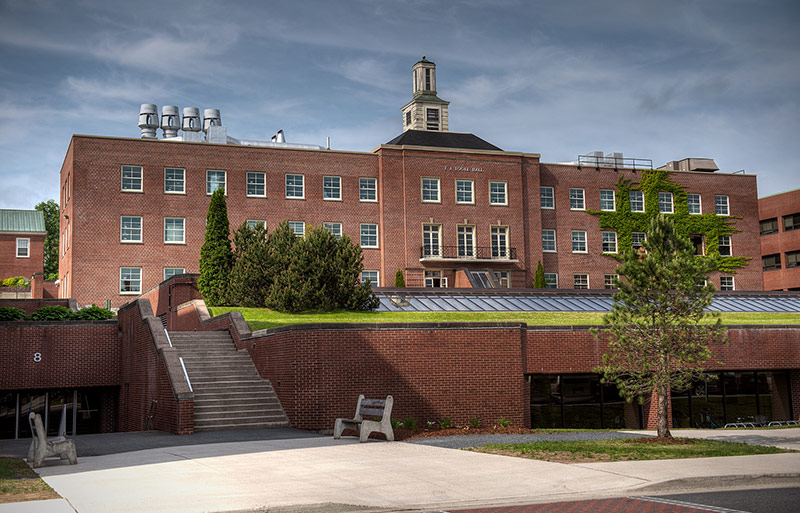New critical research equipment acquired for UNB thanks to funding support from ACOA, NBIF and NBHRF
Author: UNB Newsroom
Posted on Nov 30, 2021
Category: UNB Fredericton

The words “chemistry research” may prompt thoughts of beakers, Bunsen burners and safety goggles. While those are indispensable tools in a laboratory, there is one piece of equipment that researchers consider essential that is much more complex and expensive.
With a price tag of around $900,000 for the equipment alone, plus the cost of upgrading the infrastructure to house it, replacing a nuclear magnetic resonance (NMR) spectrometer isn’t an everyday occurrence; in fact, the two at the University of New Brunswick had already reached the end of their ideal lifecycle. But for chemists, there are few pieces of equipment more necessary for advanced research.
Students and faculty routinely use these devices many times a week, if not daily, and most funded chemistry research projects will require NMR spectroscopy at some point. The process allows researchers to determine the structure and composition of a material significantly faster and with a smaller sample than many other analytical techniques.
“With 70 per cent of sponsored research in the province taking place here, we work to ensure that our researchers have access to the essential facilities they need to succeed,” said Dr. Dave MaGee, vice-president (research) at UNB. “Thanks to our partners, we will be better able to support research across a vast range of subject areas by our researchers and by our province’s innovators.”
The new instrument, a state-of-the-art Bruker AVANCE NEO 400 MHz NMR spectrometer, will not only replace both existing instruments on UNB’s Fredericton campus, but will increase the lab’s capabilities and output beyond what both devices were collectively capable of, all while decreasing operating costs.
For example, the spectrometer is equipped with an autosampler robot that can hold and change up to 60 samples, enabling users to run overnight testing without intervention, significantly increasing throughput capacity. The new instrument is also fitted with a second probe which provides the capability for testing semi-solid samples, including biological tissue and polymers, that will advance new areas of research.
Acquisition of the device was made possible with $150,000 from the Atlantic Canada Opportunities Agency (ACOA), $300,000 from the New Brunswick Innovation Foundation (NBIF) through its Strategic Opportunities Initiative, $50,000 from the New Brunswick Health Research Foundation’s (NBHRF) Research-Related Support Grant program, and approximately $290,000 directly contributed by UNB.
“We are committed to investing in science and research that help tackle challenges in all sectors of the economy,” said the Honourable Dominic LeBlanc, Minister of Intergovernmental Affairs, Infrastructure and Communities. “That’s why the Government of Canada, through ACOA, is pleased to support UNB’s equipment upgrades at its NMR facility, allowing industry partners to access important research, resources and specialized equipment.”
Minister LeBlanc spoke on behalf of the Honourable Ginette Petitpas Taylor, Minister of Official Languages and Minister responsible for ACOA.
UNB’s NMR facilities are not just used by faculty and students; as one of two university facilities of its size in the province, companies in the region also rely on UNB to provide them with advanced analytical services. By offering this access to NMR analysis to partners in the province, UNB is better able to support New Brunswick’s innovative industry and community groups.
“This instrument will be a game changer for applied chemical research in New Brunswick,” said Dr. Laura Richard, director of research for the NBIF. “As one of the best NMR instruments in the region, and with strong research expertise behind it, we are confident that this will open exciting new avenues to support companies in their product development, as well as launching novel commercialization opportunities.”
With important applications in research that supports the well-being of New Brunswickers, the new infrastructure was also welcomed by NBHRF.
“We are proud to support the acquisition of this critical piece of equipment,” said director of programs Leah Carr. “As chemistry is a crucial component of biomedical health research, the inquiry facilitated by the NMR instrument will contribute to the success of our researchers in New Brunswick and support the important training and development of the next generation.”
The new device will also enhance student learning and workforce preparation for highly qualified personnel: By being trained on an industry-leading device, the numerous undergraduate and graduate students who use the NMR facility will be better positioned to join or lead advanced industry and research groups.
Media contact: Jeremy Elder-Jubelin
